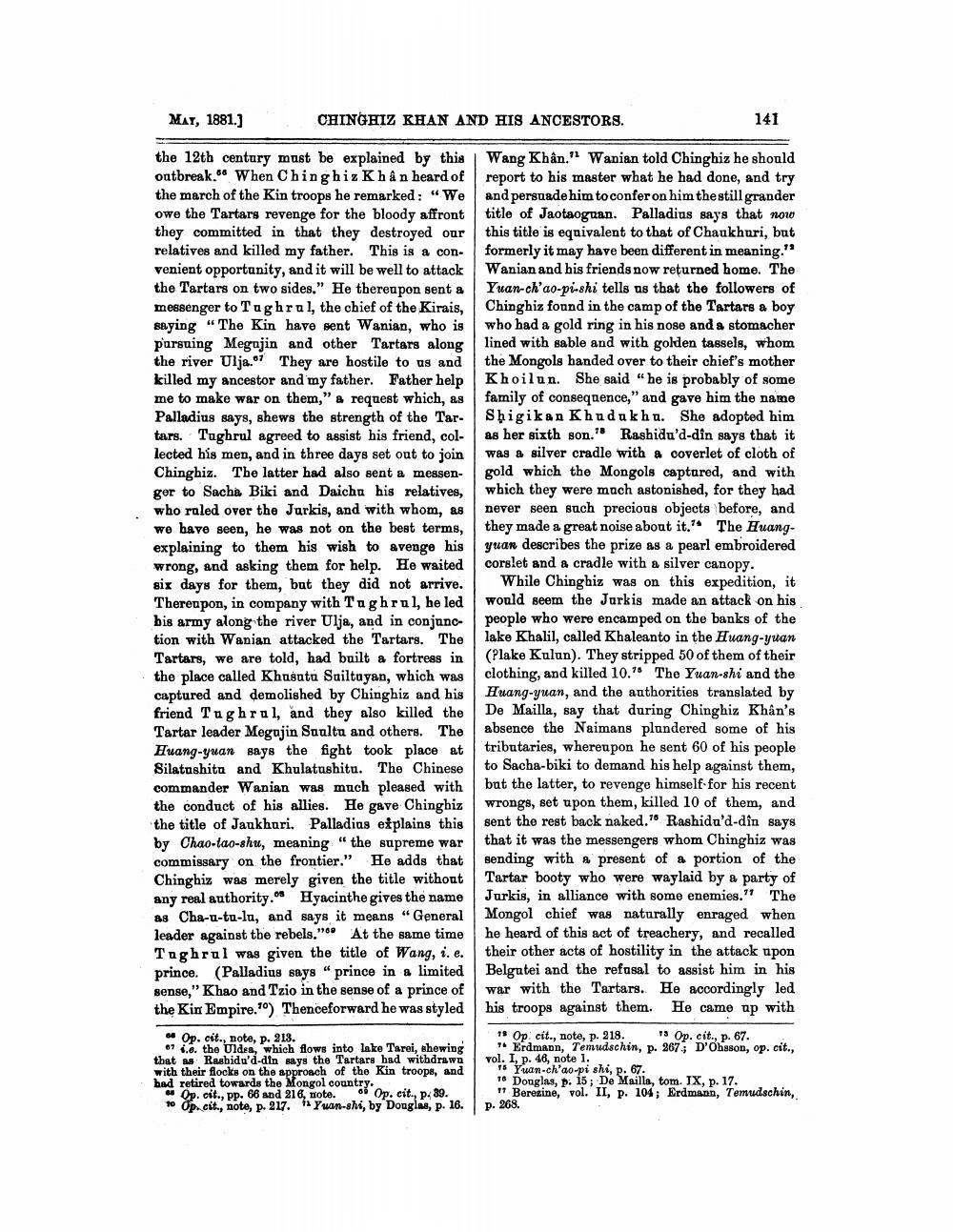________________
MAT, 1881.)
CHINGHIZ KHAN AND HIS ANCESTORS.
141
the 12th century must be explained by this outbreak. When Chinghiz Khân heard of the march of the Kin troops he remarked: “We owe the Tartars revenge for the bloody affront they committed in that they destroyed our relatives and killed my father. This is a convenient opportunity, and it will be well to attack the Tartars on two sides." He thereapon sent a messenger to Taghral, the chief of the Kirais, saying "The Kin have sent Wanian, who is pursuing Megajin and other Tartars along the river Ulja.07 They are hostile to us and killed my ancestor and my father. Father help me to make war on them," a request which, as Palladius says, shews the strength of the Tartars. Tugbrul agreed to assist his friend, collected his men, and in three days set out to join Chinghiz. The latter had also sent a messenger to Sacha Biki and Daicha his relatives, who ruled over the Jurkis, and with whom, as we have seen, he was not on the best terms, explaining to them his wish to avenge his wrong, and asking them for help. He waited six days for them, but they did not arrive. Thereapon, in company with Taghrul, he led bis army along the river Ulja, and in conjunction with Wanian attacked the Tartars. The Tartars, we are told, had built a fortress in the place called Khusnta Sailtayan, which was captured and demolished by Chinghiz and his friend Tughral, and they also killed the Tartar leader Megajin Suulta and others. The Huang-yuan says the fight took place at Silatushita and Khulatushitu. The Chinese commander Wanian was much pleased with the conduct of his allies. He gave Chinghiz the title of Jankhuri. Palladius explains this by Chao-tao-shu, meaning "the supreme war commissary on the frontier." He adds that Chinghiz was merely given the title without any real authority. Hyacinthe gives the name as Cha-u-tu-lu, and says it means “General leader against the rebels."** At the same time Taghrul was given the title of Wang, i.e. prince. (Palladius says "prince in a limited sense," Khao and Tzio in the sense of a prince of the Kirr Empire.") Thenceforward he was styled
68 Op. cit., note, p. 213. 07 1.e. the Uldes, which flows into lake Tarei, chewing that as Rasbidu'd-din says the Tartars had withdrawn with their flocks on the approach of the Kin troope, and had retired towards the Mongol country.
w Op. cit., pp. 66 and 216, note. Op. cit., p. 89. 10 Op.cit., note, p. 217. 2 Yuan-shi, by Douglas, p. 16.
Wang Khân." Wanian told Chinghiz he should report to his master what he had done, and try and persuade him to confer on him the still grander title of Jaotaoguan. Palladius says that now this title is equivalent to that of Chaukhari, but formerly it may have been different in meaning." Wanian and his friends now returned home. The Yuan-ch'ao-pi-shi tells as that the followers of Chinghiz found in the camp of the Tartars a boy who had a gold ring in his nose and a stomacher lined with sable and with golden tassels, whom the Mongols handed over to their chief's mother Khoilun. She said " he is probably of some family of consequence," and gave him the name Shigikan Khudukha. She adopted him as her sixth son." Rashidu'd-dîn says that it was a silver cradle with a coveriet of cloth of gold which the Mongols captured, and with which they were mach astonished, for they had never seen such precious objects before, and they made a great noise about it." The Huangyuan describes the prize as a pearl embroidered corslet and a cradle with a silver canopy.
While Chinghiz was on this expedition, it would seem the Jurkis made an attack on his people who were encamped on the banks of the lake Khalil, called Khaleanto in the Huang-yuan (Plake Kulun). They stripped 50 of them of their clothing, and killed 10." The Yuan-shi and the Huang-yuan, and the authorities translated by De Mailla, say that during Chinghiz Khân's absence the Naimans plundered some of his tributaries, whereupon he sent 60 of his people to Sacha-biki to demand his help against them, but the latter, to revenge himself for his recent wrongs, set upon them, killed 10 of them, and sent the rest back naked." Rashidu'd-dîn says that it was the messengers whom Chinghiz was sending with present of a portion of the Tartar booty who were waylaid by a party of Jurkis, in alliance with some enemies." The Mongol chief was naturally enraged when he heard of this act of treachery, and recalled their other acts of hostility in the attack upon Belgatei and the refusal to assist him in his war with the Tartars. He accordingly led his troops against them. He came up with
** Op. cit., note, p. 218. 13 Op. cit., p. 67.
** Erdmann, Temudschin, p. 267; D'Ohsson, op. cit., vol. I, p. 46, note 1.
15 Yuan-ch'ao-pishi, p. 67. 16 Douglas, p. 15; De Mailla, tom. IX, p. 17.
" Berezine, vol. II, p. 104; Erdmann, Temudschin, p. 268.




